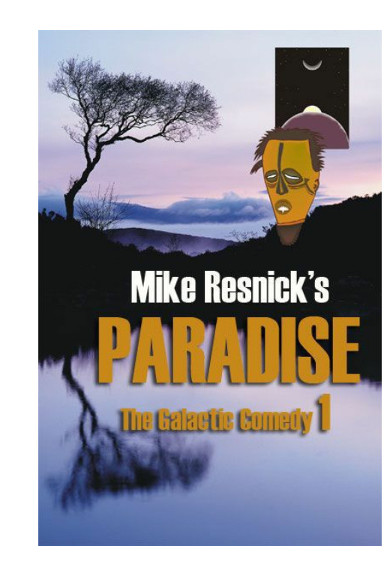
The novel “Paradise” by Mike Resnick was published for the first time in 1993. It’s the first book in the Galactic Comedy series.
Matthew Breen is a journalist who wants to write a book on the planet Peponi, a former human colony to which the Republic granted independence, leaving the government to the native sentient species. To do this, he interviews some people who lived on Peponi and then left it.
A few years later, Matthew Breen gets invited to Peponi by its president Buko Pepon, who asks him to write his biography. To do this, the journalist must not only interview him but also investigate the situation of the planet and the natives after independence, discovering a series of problems.
“Paradise” begins with an introduction in which Mike Resnick tells a Kenyan parable about a scorpion and a crocodile. It’s a variant of a well-known parable that in this case ends in a way different than usual. The author specifies that it has nothing to do with the novel, which concerns the mythical world of Peponi rather than the real nation of Kenya. This means that it’s an allegory of the history of Kenya barely disguised as science fiction.
This novel is set in the same fictional universe of many other works by Mike Resnick and ends several decades before the start of the Starship series, which occurs in the novel “Starship: Mutiny“. A planet rich in resources is named Peponi, which means “paradise” in the Swahili language, by human beings who colonize subduing the sentient natives, whose technological level at that point is of hunter-gatherers, who are exploited as a labor force.
The allegory in “Paradise” is often very transparent with Peponi colonized by humans representing Kenya colonized by the British. The reconstruction of its colonial history made by the journalist Matthew Breen through interviews with people who have long lived on Peponi seems sometimes taken from some history book to which Mike Resnick replaced some names. The author invented the names of some people who represent historical figures and the names of some native species to replace lions and elephants.
In the case of “Paradise”, the protagonist Matthew Breen tells in the first person the work he does to collect the material he needs to write his books, interviewing people and traveling to Peponi. In the first part, he’s not even on the planet but meets in other places people who left it. This means that the events are not experienced by the protagonist but are told him and some readers might not like it.
Those events concern a very long period of the history of the planet Peponi. The long colonial period is told initially from the point of view of some humans who are nostalgic of the allegedly good old days in which they thought the planet was a paradise. That’s the period in which Peponi’s resources are exploited and at the moment when the natives obtain independence the consequences on the environment are very serious as for example some species have become extinct or are endangered.
For the story of the post-colonial period, the protagonist Matthew Breen goes to Peponi, where he meets its native president Buko Pepon. again the allegory is transparent because the character is inspired to Jomo Kenyatta, the first president of Kenya after independence.
Since “Paradise” is developed above all in the form of interviews, the pace tends to be slow. In my opinion that’s fine for a novel of this kind, which offers food for thought and then gives readers time to understand the various facets of colonial and post-colonial history of the planet Peponi.
The structure decided by Mike Resnick is also seen in the character development. It’s unusual in the sense that normally in a novel narrated in the first person the narrator tends to be the most developed character while there may be problems with the others, Instead in “Paradise” the opposite happens.
This makes sense because Matthew Breen just gathers experiences from others without making judgments. Instead, it’s the opinions of people – human or not – who live or have lived on Peponi that are important to allow the reader to understand the various points of view.
The result is a novel that’s really out of the ordinary in the way it was developed. I found very interesting the way Mike Resnick told the story of a civilization that in a very short time got completely transformed and the long-term problems that followed. If you want to understand colonialism and its consequences, “Paradise” is a must-read.


Permalink